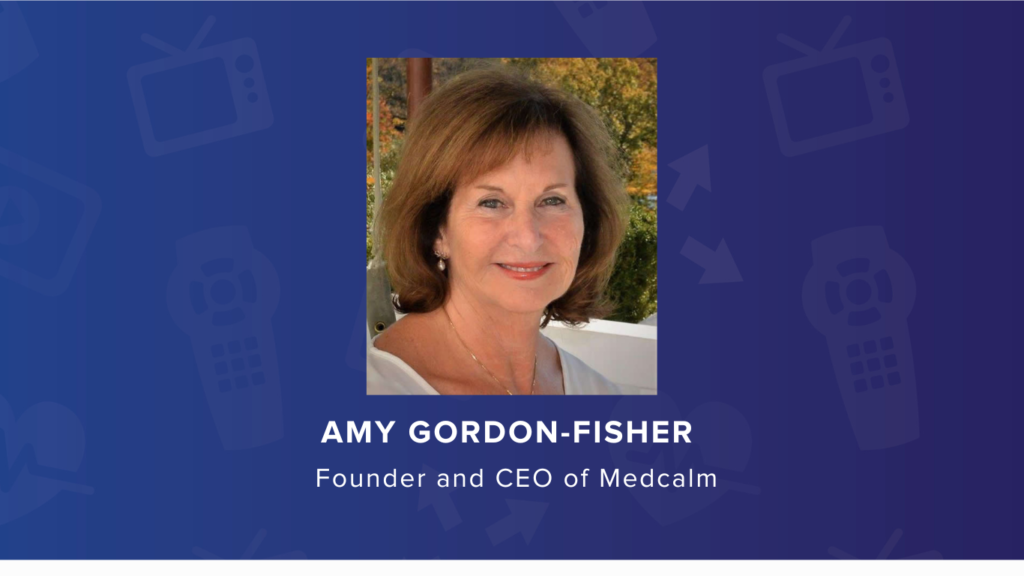
Calming content is part of a holistic approach to patient care, which addresses the complex spiritual, physical, social, and emotional needs of the patient further humanizing their care experience. An article published in the National Library of Medicine titled, Optimal Healing Environments reveals that calming content leads to more positive outcomes for patients. It states, “creating a healing space, one that evokes feelings of serenity, calm, and relaxation, can contribute to an environment that facilitates the innate healing process—a process of repair, recovery, and return to wholeness in mind, body, and spirit.”
Recently, we spoke with Amy Gordon-Fisher, Founder and CEO of Medcalm, a content partner at MDM Healthcare. Medcalm is an innovative company dedicated to bringing sound healing and relaxation programs to people wherever needed. Medcalm services hundreds of hospitals nationwide and is one of the premier audio/visual wellness solution providers worldwide. The Journey PX solution My Stay includes Medcalm’s calming and relaxation tools, which support a holistic approach to patient care.
“Amy has been a wealth of information and assistance in my practice as a clinician and a leader when it comes to providing a relaxing, therapeutic environment for patients and families in all settings, hospitals, treatment areas, clinics, waiting rooms, you name it, she has put calming content there. We take care of patients in a very clinical matter, but it is oftentimes initiatives like this, the calming content, that really helps provide patients and their families with peace of mind and helps them relax, which promotes healing,” stated Linda Robinson MSN, BSN, RN, the Vice President of Clinical Excellence at MDM Healthcare.
Gordon-Fisher explained that she started Medcalm 20 years ago while she was experiencing her mother's walk-through pancreatic cancer. “When we took her for her treatments, the front of the office was beautiful, however, the area where she was getting treatment was dismal. There was nothing comforting inside the patient’s treatment areas and many people were alone. I thought that this was not a very healthy environment for cancer patients trying to get better. I thought that there must be something better,” she said. Gordon-Fisher explained that she started the company because she believed her work in guided imagery and mindfulness meditation would help elevate the hospital environment and began creating a series of relaxing video and audio programs. She explained that once companies such as MDM Healthcare saw what she was doing, they began partnering with her to help put this content into hospitals and patient rooms.
Medcalm - Underwater Visions from Medcalm on Vimeo.
Gordon-Fisher explained that the practice of using relaxing content to help heal patients has now become part of a popular approach to care referred to as integrative medicine, “which means we walk hand in hand with other treatments, which is quite a change, and I think the patients and the families appreciate that,” she said.
Gordon-Fisher shared a letter from a patient’s family member to demonstrate how impactful healing content inside the hospital could be. They were writing to share their experience with one of Medcalm’s most popular calming videos, Underwater Visions. In the letter, they stated, “I am sure you folks produce these videos and then never know what impact they have on the people who watch them. We were at a hospital in Virginia, and previously my mom lived in Florida, so she really loves beach and water scenes. There is an aquarium in her assisted living community, and she enjoys that too. The underwater video was simply perfect for all of us. The videos are a nice anecdote to the sterile hospital environment. My mom has dementia, so a TV show with a narrative does not work for her, and she is hard of hearing and does not have her hearing aids in the hospital, so that makes the visual impact your videos have even more important.”

Calming content can also neutralize the chaotic hospital environment which can be harmfully distracting, cause anxiety and interrupt patient’s sleep. "On average, a patient endures 135 different alarms each day. Hospitals are often louder than a highway during rush hour, and sleep deprivation is a common complaint. The cacophony is not only bothersome, but can endanger lives, as many caretakers and doctors suffer from what they call alarm fatigue. They hear so many abrasive sounds that they simply ignore up to 10% of important lifesaving alarms,” said Gordon-Fisher. Restful sleep is part of healing and Medcalm’s content has been proven to aid in helping patients’ sleep. Gordon-Fisher referenced a case study on the subject in her interview. “There was a study at a VA hospital where patients who were having trouble sleeping were offered a choice between listening to Medcalm programs or taking sleep medication, and it revealed that patients were sleeping better listening to the programs. Also, it is much better for patients than sleep medication,” she said.
Gordon-Fisher also explained the science behind the healing power of the nature videos shown on the televisions inside patient rooms and on the digital signage inside hospitals. She affirmed the fact that calming content provides so much more than just distraction, it has been proven to support healing. “We have some valuable information on why nature is so impactful and what it can do for the patient. Hospital patients have no chance of getting out into nature, so we try to provide that through our content. Just showing content with nature on the televisions inside the patient’s room achieves positive outcomes on psychological relaxation and stress recovery. Studies have proven the healing benefits of viewing nature and how simply viewing that scenery led to a more relaxed body response,” she said.
“Patients are basically captives in their rooms, and what a hospital chooses to put on is in many ways critical to their health,” said Gordon-Fisher. Journey PX humanizes care through patient engagement technology, and this is accomplished partly by partnering with premium content providers like Medcalm. “It is so beneficial having these calming videos in the patient’s room and accessible through our patient engagement solution, Journey PX. It also allows for the content to be individualized. The patients get a package of videos to choose from, and so do their families. It provides a much better atmosphere inside the hospital room,” stated Linda Robinson MSN, BSN, RN, the Vice President of Clinical Excellence at MDM Healthcare.
Journey PX is committed to addressing the complex needs of patients across the continuum of care. As previously highlighted, the Journey PX solution My Stay offers patients Medcalm’s calming videos for relaxation and meditation, as well as an extensive library of patient education videos, which allow patients to access the education they need to become more informed about their condition and proactive about their care. Patients can obtain the emotional support they need by connecting with loved ones virtually in their hospital room with Journey PX’s Connect solution. The Journey PX solution My Day Today, is a digital whiteboard that integrates with the hospital’s EMR and provides accurate health information to patients and their families in real-time. This offers patients peace of mind by providing them with vital health information.
You can hear more from Amy Gordon-Fisher about the healing power of calming content, including the origins of sound healing music and the science behind the relaxation response in our PX Space podcast interview. View more information about Medcalm and sample some of their calming videos on their website.


